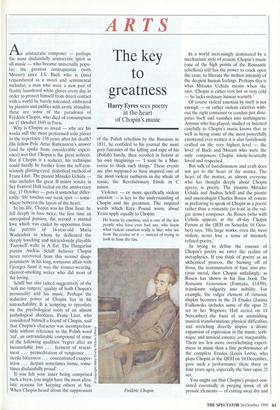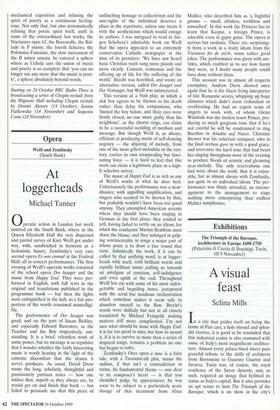ARTS
The key to greatness
Harry Eyres sees poetry at the heart of Chopin's music
aristocratic composer — perhaps the most disdainfully aristocratic spirit in all music — who became universally popu- lar; the greatest contrapuntist (with Mozart) since J.S. Bach who is (mis) remembered as a sweet and sentimental melodist; a man who wore a new pair of freshly laundered white gloves every day in order to protect himself from direct contact with a world he barely tolerated, embraced by pianists and publics with erotic abandon: these are some of the paradoxes of Frederic Chopin, who died of consumption on 17 October 1849 in Paris.
Why is Chopin so loved — why are his works still the most performed solo pieces in the repertoire 150 years after his death? His fellow-Pole Artur Rubenstein's answer (and he spoke from considerable experi- ence) was that Chopin is the great seducer. But if Chopin is a seducer, his technique could hardly be further from the self-con- sciously glinting-eyed, diabolical method of Franz Liszt. The pianist Mitsuko Uchida — who includes the great 13 minor sonata in her Festival Hall recital on the anniversary day, 17 October — puts it somewhat differ- ently: 'He touches our weak spot — some- where between the layers of the heart.'
In his life, Chopin was no Don Juan: he fell deeply in love twice, the first time an unrequited passion, the second a mutual love which was ended by opposition from the parents of 16-year-old Maria Wodzinksa to whom he dedicated the deeply touching and miraculously playable 'Farewell' waltz in A flat. The Hungarian pianist Andras Schiff believes Chopin never recovered from this second disap- pointment: in his long, torturous affair with Georges Sand it was the trouser-wearing, cheroot-smoking writer who did most of the loving.
Schiff has also talked suggestively of the `noli me tangere' quality of both Chopin's personality and his music. Perhaps the seductive power of Chopin lies in his untouchability. It is tempting to speculate on the psychological roots of an almost pathological aloofness. Franz Liszt, who considered himself a friend of Chopin, said that Chopin's character was incomprehen- sible without reference to the Polish word `zal', an untranslatable compound of some I of the following qualities: 'regret after an inconsolable loss ... ferment of resent- ment ... premeditation of vengeance .. sterile bitterness.,, concentrated exasper- ation... despair sometimes ironic, some- times disdainfully proud'.
If you felt your inner being comprised such a brew, you might have the most altru- istic reasons for keeping others at bay. When Chopin heard about the suppression
of the Polish rebellion by the Russians in 1831, he confided to his journal the most gory fantasies of the killing and rape of his (Polish) family, then recoiled in horror at his own imaginings — 'I must be a Mus- covite to think such things.' These events are also supposed to have inspired one of the most violent outbursts in the whole of music, the Revolutionary Etude in C minor.
Violence — or more specifically violent emotion — is key to the understanding of Chopin and his greatness. The inspired words which Ezra Pound wrote about Yeats apply equally to Chopin:
He learns by emotion, and is one of the few people who have ever had any, who know what violent emotion really is like; who see from the centre of it — instead of trying to look in from the rim.
Frederic Chopin In a world increasingly dominated by a mechanistic style of reason, Chopin's music (one of the high points of the Romantic rebellion) still has the power to crack open the crust, to liberate the molten intensity of the deepest human feelings. Perhaps this is what Mitsuko Uchida means when she says, 'Chopin is either very hot or very cold — he lacks ordinary human warmth.'
Of course violent emotion by itself is not enough — or rather violent emotion with- out the right container or conduit just dissi- pates itself and vanishes into nothingness. Anyone who has played, studied or listened carefully to Chopin's music knows that as well as being some of the most powerfully emotional ever written it is also fastidiously crafted on the very highest level — the level of Bach and Mozart who were the only composers Chopin whole-heartedly loved and respected.
But talk of fastidiousness and craft does not get to the heart of the matter. The heart of the matter, as almost everyone who has thought deeply about Chopin agrees, is poetry. The pianists Mitsuko Uchida and Andras Schiff and the pianist and musicologist Charles Rosen all concur in preferring to speak of Chopin as a poetic rather than a romantic (at least in the vul- gar sense) composer. As Rosen (who with Uchida appears at the all-day Chopin Forum at the QEH on Saturday 16 Octo- ber) says, 'His large works, even the most violent, never lose a sense of intensely refined poetry.'
In trying to define the essence of Chopin's poetry we enter the realms of metaphysics. If you think of poetry as an alchemical process, the burning off of dross, the transmutation of base into pre- cious metal, then Chopin unfailingly, as
Rosen has shown in his fine book The Romantic Generation (Fontana, f14.99),
transforms vulgarity into nobility. For example, the vulgar element of virtuosic display becomes in the 24 Etudes (Janina Fialkowska includes some of the opus 25 set in her Wigmore Hall recital on 14 November) the basis of an astonishing musical transformation: physical difficulties and stretching directly inspire a divine expansion of expression in the music; tech- nique and musical essence are inseparable.
There are few more overwhelming experi- ences in music than a fine performance of the complete Etudes (Louis Lortie, who plays Chopin at the QEH on 10 December, gave such a performance there three or four years ago), especially the later opus 25 set.
You might say that Chopin's project con- sisted essentially in purging music of all prosaic elements — of cutting away dry and mechanical exposition and infusing the spirit of poetry as a continuous feeling- tone. Not only that, but also systematically refining that poetic spirit itself, until in some of the extraordinary last works, the Nocturnes opus 62, the Barcarolle, the Bal- lade in F minor, the fourth Scherzo, the Polonaise-Fantaisie, the slow movement of the B minor sonata, he entered a sphere where as Uchida says the union of music and poetry is so complete that 'you can no longer say any more that the music is poet- ic', a sphere absolutely beyond words.
Starting on 24 October BBC Radio Three is broadcasting a series of Chopin recitals from the Wigmore Hall including Chopin recitals by Dimitri Alexeev (14 October); Janina Fialkowska (14 November) and Sequeira Costa (24 November).



















































































 Previous page
Previous page